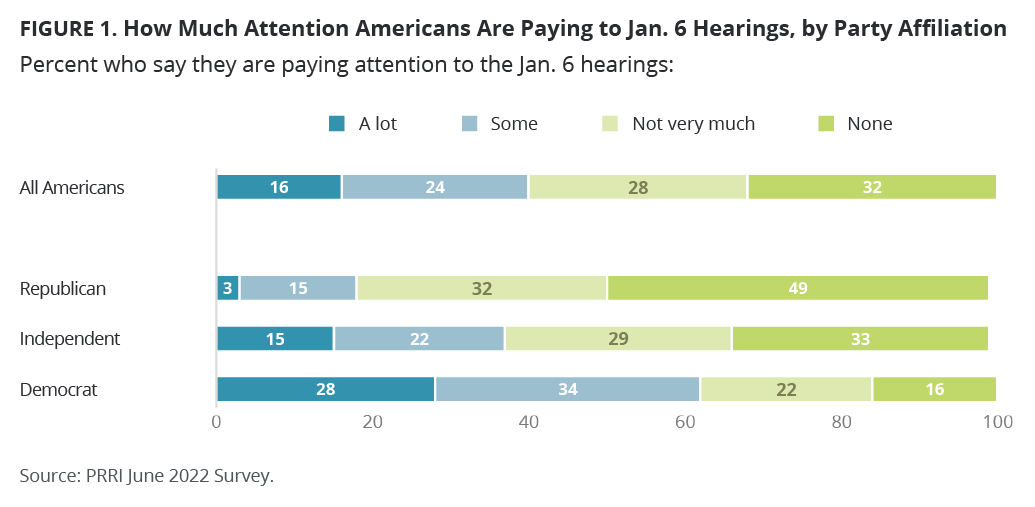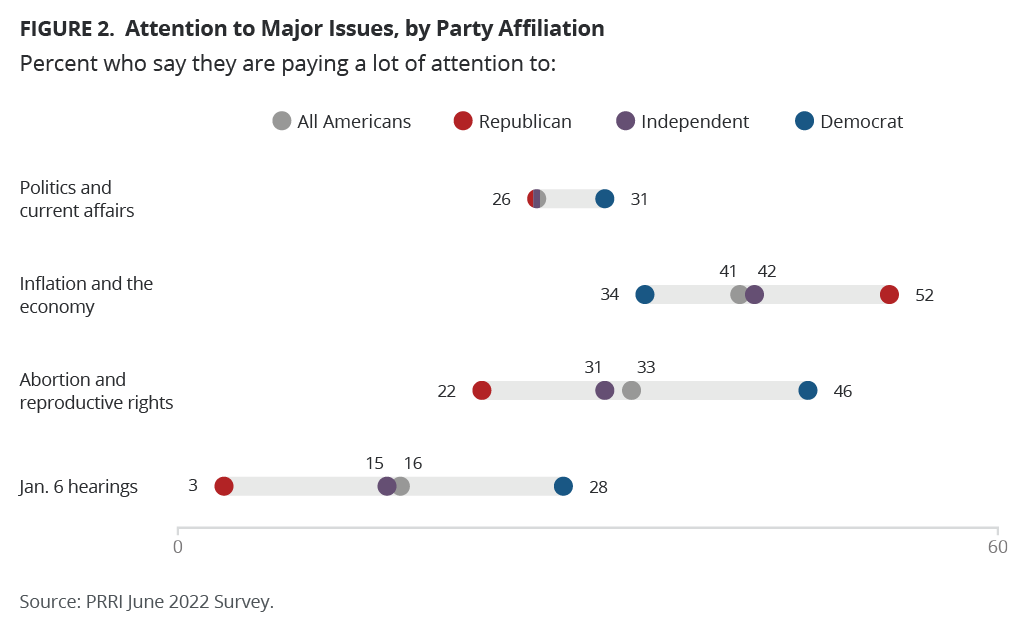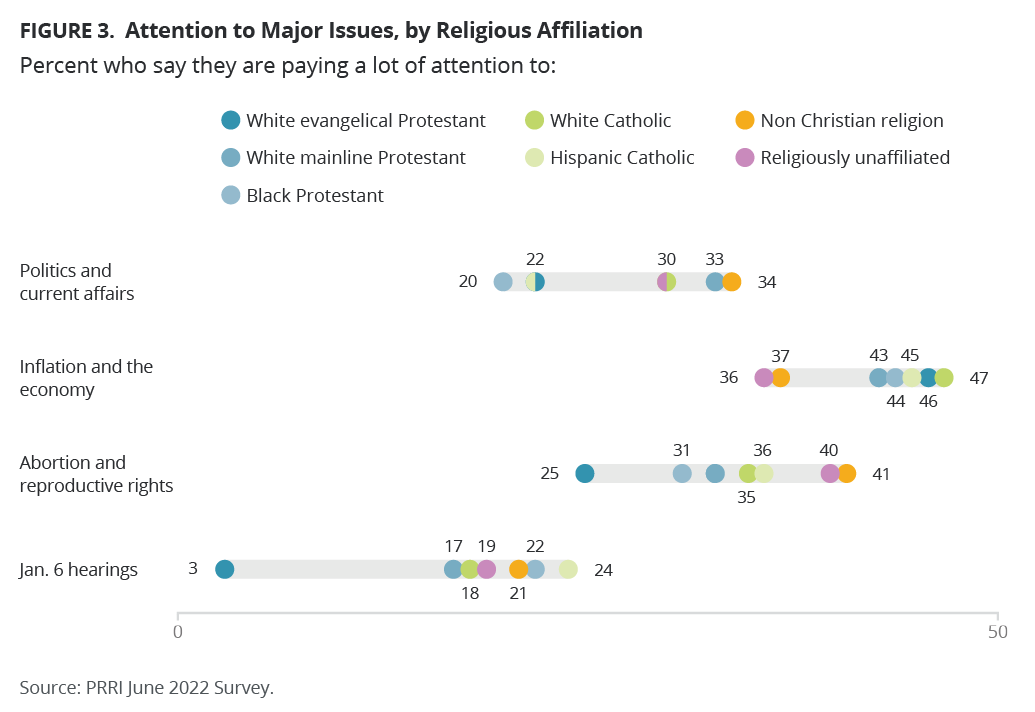As the U.S. House Select Committee to Investigate the January 6th Attack on the United States Capitol continues to hold public hearings highlighting the role former President Donald Trump played in the events of that day, data from a PRRI survey completed in late June shows that few people are giving the topic much attention. Sixteen percent of Americans say they are paying a lot of attention to the hearings, another 24% say they are paying some attention, 28% say they are not paying very much attention, and 32% say they are paying no attention.
Additionally, among those whose views on Trump’s role in the events of Jan. 6 might be challenged by information presented in the hearings, very few are watching. Only 3% of Republicans say they are paying a lot of attention to the hearings, and 15% say they are paying some attention. One-third are not paying very much attention (32%), and half are paying no attention at all (49%). In previous PRRI surveys, 68% of Republicans said the 2020 election was stolen from Trump, and only 15% of Republicans blamed Trump for the events of Jan. 6, 2021.
By contrast, 89% of Democrats believed Trump was to blame, and the new survey shows that 28% of Democrats are paying a lot of attention to the hearings, 34% are paying some attention, 22% are not paying very much attention, and only 16% are paying no attention at all. Independents are mixed — 15% are paying a lot of attention, 22% some attention, 29% not very much attention, and 33% no attention at all.

White evangelical Protestants (3%) are notably less likely than other religious groups (17-24%) to say they are paying a lot of attention to the hearings. The survey also found significant age and education gaps in the amount of attention paid to the hearings. Americans ages 18-29 (8%) and 30-49 (9%) are less likely than those ages 50-64 (20%) and 65 and over (28%) to say they are paying a lot of attention to the hearings. One in ten Americans with a high school education (10%) say they are paying a lot of attention to the hearings, compared to 17% of those with some college, 19% of those with a bachelor’s degree, and 26% of those with a graduate degree.
What Are Americans Paying Attention To?
About a quarter of Americans (26%) say they pay a lot of attention to politics and current affairs, with Democrats (31%) slightly more likely to say this than independents (26%) and Republicans (26%).
Men (30%) are more likely than women (22%) to say they are paying a lot of attention to politics and current affairs. Attention increases with age: Only 16% of those 18-29 and 19% of those 30-49 say they pay a lot of attention to politics and current affairs, but the number jumps to 30% among those ages 50-64 and 41% among the 65-and-older group. Similarly, as education increases, so does attention — 17% of those with a high school education, 28% with some college, 33% with a bachelor’s degree, and 36% with a graduate degree report paying a lot of attention.
Some religious groups are more likely than others to pay a lot of attention to politics and current affairs right now, including white mainline Protestants (33%), white Catholics (30%), non-Christian religious Americans (34%) and religiously unaffiliated Americans (30%).

Attention to Abortion and Reproductive Rights Issues
This survey was conducted the weekend after the U.S. Supreme Court delivered its decision in Dobbs v. Jackson Women’s Health Organization, overturning Roe v. Wade and invalidating the national guarantee of a right to abortion, so, not surprisingly, attention to the issue was relatively high. One-third (33%) report paying a lot of attention to abortion and reproductive rights issues, while another 39% say they are paying some attention to the topic. Less than one in five (17%) are not paying very much attention, and just 11% are not paying any attention.
Democrats (46%) are much more likely than independents (31%) and Republicans (22%) to say they are paying a lot of attention to abortion and reproductive rights issues. Additionally, non-Christian religious Americans (41%), religiously unaffiliated Americans (40%), Hispanic Catholics (36%), and white Catholics (35%) are the religious groups most likely to say they are paying a lot of attention to these issues.
Not surprisingly, women (36%) are more likely than men (29%) to say they are paying a lot of attention to abortion and reproductive rights issues. Younger Americans remain less likely than older Americans to say they are paying a lot of attention to this issue, but the gap is much smaller than on the other issues asked about in the survey – 31% of those ages 18-29, 30% of those ages 30-49, 33% of those ages 50-64, and 39% of those 65 and over say they are paying a lot of attention to abortion and reproductive rights.

Attention to Inflation and the Economy
The survey found trends in attention to inflation and the economy that are opposite to those regarding abortion and reproductive rights. Four in ten Americans (41%) say they are paying a lot of attention to this issue, and more Republicans (52%) than independents (42%) and Democrats (34%) report giving it a lot of attention. There are not large differences by religious group in this area.
Men (45%) are more likely than women (37%) to say they are paying a lot of attention to inflation and the economy. There is a larger age gap, with 26% of those ages 18-29, 35% of those ages 30-49, 51% of those ages 50-64, and 52% of those age 65 and over saying they pay a lot of attention to inflation and the economy.